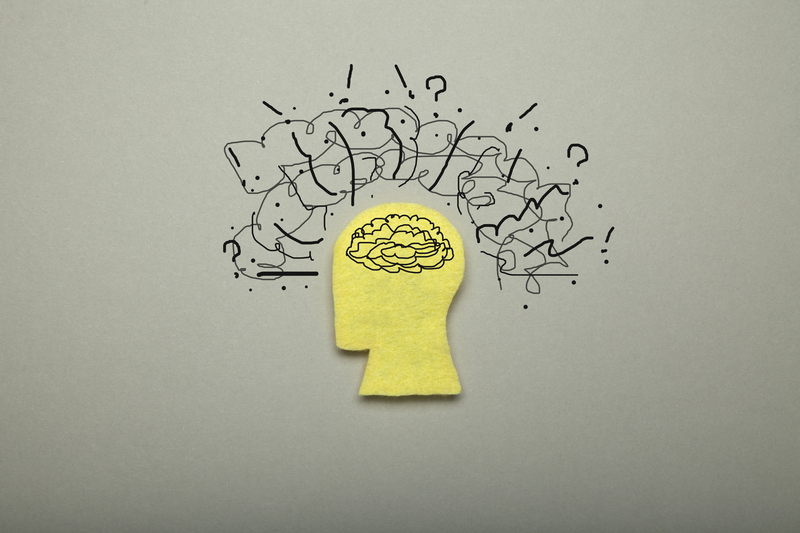The 7+ Worst Habits for Your Brain Health

When it comes to boosting health, a lot of the focus is on increasing fitness levels, maintaining a healthy weight, and improving physical well-being. It’s worth arguing, though, that promoting brain health is one of the most important things we can do for not only our mental health but our overall health. After all, we need a strong mind as well as a strong body, and the two are powerfully connected. One of the best places to start is by eliminating the worst habits for brain health.
7 Worst Habits of Brain Health
To help you better care for your most valuable asset—the brain—here are 7 of the worst habits along with healthier choices.
1. Not Prioritizing Sleep
One of the worst habits for your brain, weight-loss goals, and overall health is not getting enough quality shut-eye. Our brains need a chance to rest, recover, and reorganize after a challenging day. And when you don’t get enough quality sleep, it can lead to a decline in cognitive functioning, memory, and mood. Studies even suggest it can increase the risk of dementia if not addressed. 1
Solution for a Healthy Brain: Shoot for between seven and nine hours of quality sleep every night, and prioritize healthy sleep hygiene.
2. Drinking Your Calories
While you can consume healthy smoothies that are loaded with brain-enriching nutrients, for most people, when they drink calories, they aren’t coming from healthy sources. Instead, they’re from sugar-loaded sodas or “fruit” juice cocktails.
All of that sugar can spike your blood sugar, followed by a depressing, low-energy crash. This causes you to crave more sugar as it becomes a vicious cycle of eating more sugar to only need more sugar. Ultimately, this process increases the risk of weight gain, obesity, diabetes, and decreased brain function. 2 Excess sugar consumption (e.g., more than one small beverage per day) has been linked to problems like depression, anxiety, insomnia, Alzheimer’s, dementia, decreased memory, and smaller brain volume. 3
Artificially sweetened and flavored beverages aren’t all that much better. Research with animals, for instance, found that aspartame and other artificial sweeteners may both impair memory and increase brain oxidation. 4, 5
But that’s not all: sodas are often filled with brominated vegetable oils. Limited amounts in the diet appear to be fairly benign. But for those who drink sodas day in and day out, this chemical may build up in the brain, leading to memory loss and nerve issues, which can damage the brain over time.
Solution for a Healthy Brain: Skip the sugar-loaded sodas and juices and choose plain old water instead. If you want a bit more variety, there are many healthy options, including bubbly or sparkling waters, teas of every type, coffee, etc. There are even sugar-free sodas that skip the artificial sweeteners and use natural options instead, like stevia, monk fruit, and erythritol.
3. Multitasking
Despite what many of us grew up believing, multitasking doesn’t allow us to accomplish more in less time. Quite the opposite, in fact. When you try to do two or more tasks simultaneously, you are unable to focus. This leads to decreased performance and concentration and can leave you feeling exhausted. Over time, it can also lead to decreased memory and slowed cognitive function. Worse yet, the divided attention of multitasking rewires the brain over time, so we become less effective. We also become more stressed out.
All that multitasking also leads to information overload. After all, we’re bombarded with emails, news, social updates, and a constant, never-ending stream of often useless content.
Solution for a Healthy Brain: Give yourself time and room to focus on just one thing at a time. For instance, try the Pomodoro Method, where you focus on a task for 30 minutes before giving your brain a short break as you stand and stretch, walk around, or communicate with a co-worker. Then return to your primary task for another 30 minutes of focus or move on to the next project.
Use technology to help you better deal with technology. For example, turn off notifications, change settings on your phone and computer, and limit the amount of time you read news or social updates to filter out a little more of the noise that comes in every day. In return for your efforts, you’ll increase your brain’s efficiency and your happiness.
4. Being Physically Inactive
If you’re like most adults, you sit most of the time—on average, around six and a half hours per day. 6 Yet when we sit for long periods, everything slows, including how well the brain functions. Not surprisingly, a sedentary lifestyle has been linked to heart disease, obesity, depression, and even cancer. It’s also been linked to decreased cognitive functioning and even dementia.
In other words, if your life is loaded up and you feel “too busy” for regular exercise, you’re also decreasing productivity and setting yourself up for a slow but steady cognitive decline. 7
In fact, animal research has found that a sedentary lifestyle changes the shape of neurons in the brain. 8 And human research has found that inactive people experience cognitive decline (determined by confusion and memory loss) at twice the rate as their more active counterparts.9, 10
Solution for a Healthy Brain: Keep moving throughout the day—every 15 to 30 minutes, not just during your workouts. Take time throughout the day to walk, stretch, or do heel raises or squats. Just move in any way possible. Then also enjoy a regular fitness routine that can help boost brain health and lift mood.
From day one of your exercise program, you’ll be improving brain function. It doesn’t take a lot. As little as 12 minutes of moderate cardiovascular exercise has been shown to boost cognitive functioning and energy levels. So, don’t make the mistake of underestimating the power of a simple short walk.
5. Consuming Ultra-Processed and Refined Foods
While you may feel like some high-sugar, ultra-processed foods make you happy (well, hello there, you delicious donut), these foods are likely doing the opposite. In fact, these refined foods decrease serotonin levels, a key mood-stabilizing neurotransmitter. Serotonin helps regulate sleep, inhibit pain, and lift mood, so if what you’re eating is decreasing it, you’re the opposite of happy.
Fried foods are some of the most damaging to brain health. And research has confirmed that diets high in these fried foods are linked to decreased memory and cognition scores. 11
Start looking at food not in how it tastes and makes you feel in the moment but in how you feel in the hours or day after you consume it. After consuming refined foods, because of the decreased level of serotonin, you’ll likely find you feel sluggish and even sad or depressed. 12
Solution for a Healthy Brain: Aim to get most of your calories from whole foods like quality proteins (e.g., fish, eggs, and pasture-raised meats and poultry), vegetables and fruits, fiber-rich whole grains, beans and legumes, and nuts and seeds for a happy, healthy brain.
And do your best to avoid highly processed oils like corn, rapeseed (canola), soybeans, sunflower, and safflower, which are high in refined omega-6 fats that may lead to increased brain inflammation when consumed excessively. When sautéing foods, choose olive, coconut, or avocado oils instead.
Some quality brain-boosting diets to consider include The Mind Diet, the Mediterranean Diet, and the DASH Diet. And if you have a difficult time saying no to your sweet tooth, swap out the traditional options (e.g., cakes, candy, cookies, etc.) with antioxidant-rich options like sweet berries and dark chocolate. They’re healthier for the brain and better for the waistline.
6. Chronic Stress
Stress is often made to be the villain of the story, but it’s important to remember stress can be a force for good. For example, the right amount of stress can improve focus, concentration, and productivity. On the other hand, chronic, unresolved stress (or distress) can have a profoundly negative impact on the brain and the body. It can disrupt neural communication, learning and memory, and stress hormones like cortisol. It can even increase the risk of mental illness. 13
Solution for a Healthy Brain: Stress is a natural and healthy aspect of life. Learning to live with it and tap into it for positive benefits is vital for a healthy, happy life. It’s also important to avoid letting stress build up until you burn out. Some helpful stress-relieving tools include:
- Practicing mindfulness or beginning a meditation practice
- Taking a walk
- Connecting with your friends or family members
- Playing with a pet
- Exercising regularly
- Breathing
h3>7. Too Much Alone Time
In today’s society, many of us spend a great deal of time alone. Even when we’re with others, we may be alone as we’re focused on a screen rather than on the company we’re keeping. Yes, self-care and spending some time on ourselves is valuable. But too much of a good thing is bad for our brain health, and too much screen time can be especially damaging.
Research has found, for example, that spending too much time by ourselves is as bad for the brain as not getting enough sleep. And all this time by ourselves can lead to depression, anxiety, and an increased risk of dementia. 14
Solution for a Healthy Brain: Put down the phone and put yourself out there. Get some social interaction, even if it’s just chatting with a neighbor or the person helping you check out your groceries. Better yet, get together with friends and family and head out into the great outdoors for a hike or bike ride, stroll through a museum, or gather together for a game night.
Spending time with friends, family, and your community is vital to a healthy brain. For my fellow introverts, it doesn’t take a lot of time, either. Just 10 minutes of face-to-face conversation can greatly boost brain health. 15
Worst Habits for Brain Health
Your brain has around 100 billion nerve cells and one trillion supporting cells to keep it powered up. And virtually everything you do affects how well it functions. Stopping the worst habits for brain health above can help more than you know. Yet other habits can also be detrimental to your brain health, including:
- Not drinking enough water, which can decrease executive function even in healthy young people. 16
- Smoking, which can wreck the delicate neurotransmitter balance.
- Excessive alcohol intake of more than one serving per day for women and two for men or drinking daily.
- Not getting enough exposure to sunlight. 17 Shoot for at least 10 to 20 minutes of sunshine every day. 18
- Negative thinking, which can spiral into distress and anxiety.
- Neglecting health issues, such as high blood pressure or diabetes. 19 This also includes trying to work when you’re sick. When your body is fighting an infection, it needs rest. And so does your brain. If you try to push through your sickness, you’ll not only be less efficient and productive, but you’ll be stressing your tired brain and potentially slowing recovery. 20
- Drinking too much coffee: while up to 4 cups a day (400 mg of caffeine) can be healthful, any more than that can decrease adenosine receptors, which can make you feel more tired in the long run.






 US Doctor: "Eating This Every Day Can Snap You Into Ketosis"
US Doctor: "Eating This Every Day Can Snap You Into Ketosis" 3 Key Nutrients to Help Lubricate Your "Tin Man" Joints
3 Key Nutrients to Help Lubricate Your "Tin Man" Joints AVOID Plant-Based Protein Powders (unless...)
AVOID Plant-Based Protein Powders (unless...)

